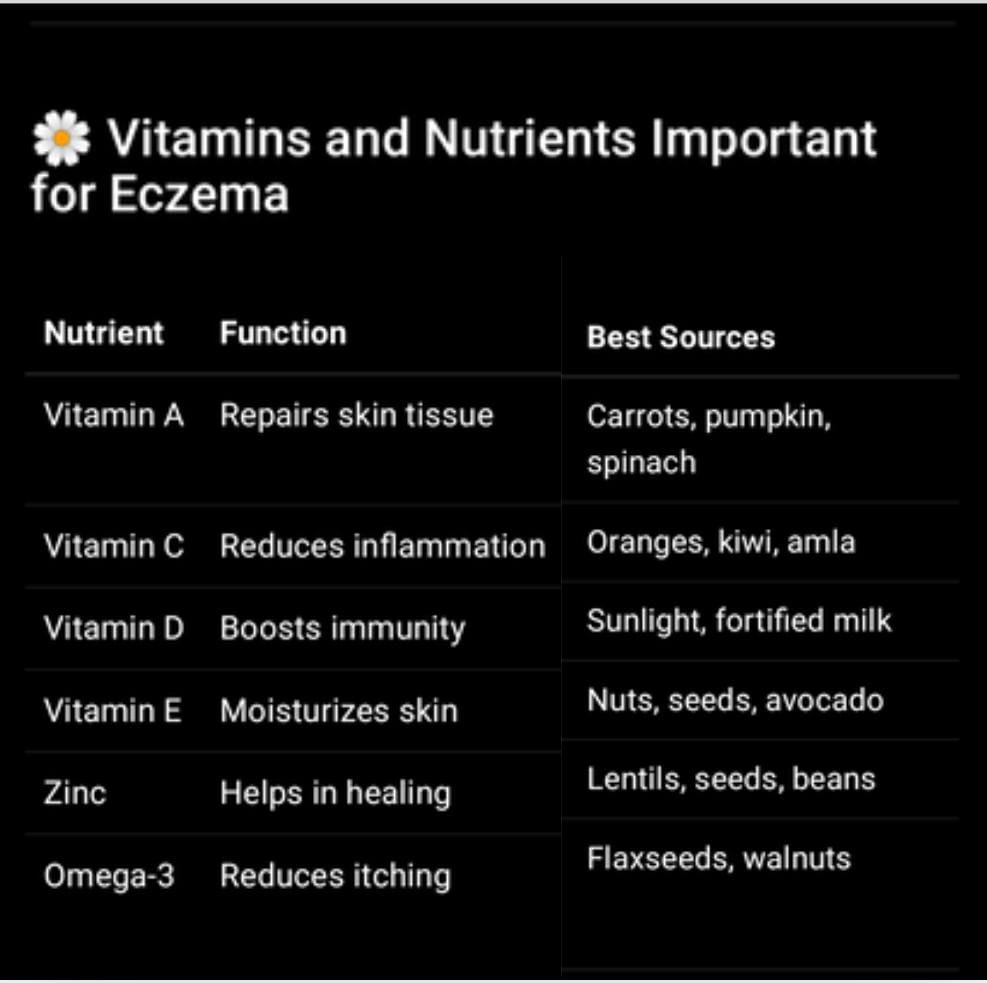Health Desk
Sandeep Dhand
Nutritionist And Health Educator
🩺 Introduction
Eczema is a very common skin condition that affects millions of people all over the world. It is also known as Atopic Dermatitis, and it causes the skin to become dry, itchy, red, and inflamed. The word eczema comes from a Greek word meaning “to boil,” which describes the hot and itchy feeling people often experience during flare-ups.
Although eczema is not a contagious disease, it can cause great discomfort and affect daily life. It can appear on the face, hands, arms, legs, and other parts of the body. Children often suffer from eczema, but adults can also develop it or continue to have it throughout life.
Understanding eczema, its causes, symptoms, and treatment is very important to manage the condition effectively. Along with medical care, nutrition and diet play a big role in keeping the skin healthy and reducing flare-ups.
🌼 What Is Eczema?

Eczema is a chronic inflammatory skin condition. It occurs when the skin barrier becomes weak and cannot protect against irritants, allergens, and bacteria. Because of this, the skin loses moisture easily, becomes dry, and reacts strongly to different triggers like soaps, weather, or stress.
There are different types of eczema, but atopic dermatitis is the most common. Other types include contact dermatitis, seborrheic dermatitis, dyshidrotic eczema, and nummular eczema.
🔍 Types of Eczema
- Atopic Dermatitis:
The most common type, usually genetic, and often linked with asthma or allergies. - Contact Dermatitis:
Caused by contact with irritants such as soaps, detergents, or chemicals. - Dyshidrotic Eczema:
Affects the hands and feet, leading to small, itchy blisters. - Seborrheic Dermatitis:
Appears on the scalp, face, or chest — often oily and scaly. - Nummular Eczema:
Causes round, coin-shaped patches on the skin that can itch and ooze. - Stasis Dermatitis:
Happens in people with poor blood flow, mostly on the lower legs.
💡 Causes of Eczema
There is no single cause of eczema. It is usually the result of several factors that work together. These include genetics, immune system problems, environmental triggers, and skin sensitivity.
Here are the main causes:
- Genetic Factors:
Eczema often runs in families. If one or both parents have eczema, asthma, or hay fever, their child is more likely to develop eczema. - Weak Skin Barrier:
A healthy skin barrier keeps moisture inside and harmful substances outside. In eczema, this barrier is weak, allowing moisture to escape and irritants to enter. - Overactive Immune System:
In people with eczema, the immune system overreacts to triggers, leading to inflammation and itching. - Environmental Triggers:
Common triggers include pollution, soaps, detergents, fragrances, dust, and weather changes (especially cold or dry air). - Allergies and Foods:
Some foods like dairy, nuts, soy, or eggs can trigger flare-ups in sensitive people. - Stress:
Mental stress and anxiety can worsen eczema symptoms. - Hormonal Changes:
Women may notice eczema flares during pregnancy or menstruation.
⚠️ Symptoms of Eczema
Eczema symptoms can vary from person to person, but the most common ones include:
Itching (Pruritus): The most common and irritating symptom. Itching can be severe, especially at night.
Redness and Inflammation: Skin becomes red, warm, and swollen.
Dry and Cracked Skin: Loss of moisture makes the skin rough and flaky.
Small Bumps or Blisters: These can ooze fluid and form crusts.
Thickened Skin: Continuous scratching can make the skin thick and leathery.
Dark Patches: The affected skin may become darker or lighter over time.
Burning or Pain: When the skin cracks, it may sting or burn.
👶 Eczema in Children
Eczema often appears in babies between 2 to 6 months old. The cheeks, scalp, and arms are most affected. As children grow, eczema can move to the elbows, knees, or neck.
Most children outgrow eczema, but some continue to have sensitive skin in adulthood.
Parents should keep the baby’s skin moisturized, use mild soaps, and avoid irritants like wool or strong detergents.
🧴 Treatment for Eczema
There is no permanent cure for eczema, but with proper care, it can be well controlled. Treatment depends on the severity of symptoms. The goal is to reduce inflammation, relieve itching, and prevent flare-ups.
- Moisturizing the Skin
Keeping the skin hydrated is the most important part of eczema care.
Use fragrance-free and hypoallergenic moisturizers.
Apply immediately after bathing to lock in moisture.
Ointments and creams work better than lotions.
- Topical Steroid Creams
For severe itching or redness, doctors may prescribe mild steroid creams such as hydrocortisone.
Use only under medical advice.
Do not overuse, as long-term use can thin the skin.
- Antihistamines
These help reduce itching and allow better sleep during flare-ups.
- Antibiotics
If the skin becomes infected due to scratching, antibiotics may be prescribed.
- Light Therapy (Phototherapy)
Exposure to controlled UV light can help reduce inflammation and itching.
- Avoid Triggers
Identify and avoid things that make eczema worse, like perfumes, detergents, and stress.
- Manage Stress
Meditation, yoga, breathing exercises, and adequate sleep can improve both mental and skin health.
🌞 Natural Home Remedies for Eczema
- Coconut Oil:
Helps reduce dryness and has antibacterial properties. Apply gently on affected areas. - Aloe Vera Gel:
Soothes irritated skin and helps with healing. - Oatmeal Bath:
Adding finely ground oatmeal to warm bathwater can relieve itching and irritation. - Cold Compress:
Applying a cool, damp cloth can calm inflammation. - Turmeric Paste:
Contains curcumin, which helps reduce skin inflammation.
🧘 Lifestyle Tips for Managing Eczema
Avoid very hot baths or showers — use lukewarm water instead.
Wear loose cotton clothes instead of wool or synthetic fabrics.
Use mild, unscented soaps and detergents.
Keep nails short to avoid skin damage from scratching.
Stay hydrated and get enough sleep.
Manage stress through meditation or light exercise.
🥗 Nutrition and Diet for Eczema
Diet plays a major role in managing eczema. Some foods help reduce inflammation, while others may trigger flare-ups. Eating a balanced diet full of vitamins, minerals, and healthy fats can support skin health.
🌿 Best Foods for Eczema
- Foods Rich in Omega-3 Fatty Acids
These healthy fats reduce inflammation and improve skin hydration.
Examples: Flaxseeds, chia seeds, walnuts, fish (like salmon, mackerel, sardines).
- Fruits and Vegetables
They are full of antioxidants that protect skin cells.
Best options: Apples, blueberries, oranges, spinach, broccoli, carrots, tomatoes, and sweet potatoes.
- Probiotic-Rich Foods
Probiotics help improve gut health, which can reduce allergic reactions.
Examples: Yogurt with live cultures, kefir, fermented foods like sauerkraut and kimchi.
- Vitamin E Foods
Vitamin E helps repair damaged skin and maintain moisture.
Sources: Almonds, sunflower seeds, avocados, and spinach.
- Vitamin C Foods
Vitamin C supports collagen production and reduces inflammation.
Sources: Citrus fruits, strawberries, kiwi, and bell peppers.
- Zinc-Rich Foods
Zinc helps in skin repair and reduces infection risk.
Sources: Pumpkin seeds, chickpeas, and lentils.
- Water
Hydration is key. Drink 8–10 glasses of water daily to keep the skin soft and moist.
🚫 Foods to Avoid in Eczema
Some foods may cause or worsen flare-ups in sensitive people. Keep a food diary to identify triggers.
Avoid or limit the following:
Dairy products (milk, cheese, butter)
Eggs
Soy products
Nuts (especially peanuts)
Gluten-rich foods (wheat, barley)
Processed and fried foods
Sugary snacks and sodas
Alcohol and caffeine
🍽️ Sample One-Day Eczema-Friendly Diet Plan
🌅 Morning (7:30 am)
Warm water with lemon
A handful of soaked almonds or walnuts
🍚 Breakfast (8:30 am)
Oatmeal cooked with almond milk
1 banana or apple
Herbal tea or green tea
🥗 Lunch (1:00 pm)
Brown rice or millet chapati
Mixed vegetable curry (with spinach, carrot, and beans)
Salad of cucumber, tomato, and beetroot
Curd (if not allergic to dairy)
☕ Evening Snack (4:30 pm)
Roasted chickpeas or fruit smoothie (with flaxseeds)
🍲 Dinner (7:30 pm)
Vegetable soup with olive oil drizzle
Steamed vegetables or dal
One multigrain chapati
🌙 Before Bed (9:30 pm)
A cup of chamomile tea or turmeric milk (use plant-based milk if dairy-sensitive)
🌼 Vitamins and Nutrients Important for Eczema

🧠 Mind and Skin Connection
The skin and mind are deeply connected. When you feel stressed or anxious, your body releases hormones like cortisol, which increase inflammation and itching. Managing stress is therefore an important part of eczema treatment.
Tips for emotional balance:
Practice deep breathing or meditation daily.
Spend time in nature.
Get 7–8 hours of sleep.
Talk to supportive friends or family.
Listen to calm music or do gentle yoga.
💬 When to See a Doctor
You should visit a dermatologist if:
The itching becomes unbearable.
The skin starts oozing pus or becomes painful.
Over-the-counter creams do not work.
You notice signs of infection (fever, swelling, crusts).
🌈 Conclusion
Eczema is not just a skin condition — it is a whole-body challenge that needs care from both inside and outside. Although it cannot be permanently cured, it can be managed successfully with proper skincare, medical treatment, and a healthy lifestyle.
A nutritious diet rich in fruits, vegetables, omega-3 fatty acids, and vitamins plays a huge role in calming inflammation and improving skin health. Avoiding trigger foods and reducing stress will make a big difference in living comfortably with eczema.
By taking care of your body, mind, and diet, you can heal your skin naturally and live a confident, itch-free life. 🌿